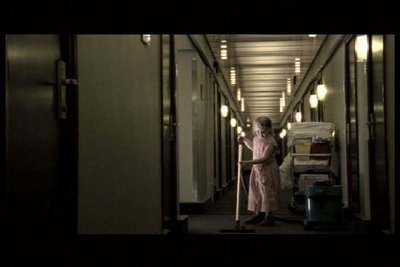the learning asylum

"Perhaps all human beings - are in the grip of an astonishing delusion. We think that we can take a picture, a structure, a working knowledge of something, constructed in our minds out of long experience and familiarity, and by turning that model into a string of words, transplant it whole into the mind of someone else.
Perhaps once in a thousand times, when the explanation is extraordinarily good, and the listener extraordinarily experienced and skillful at turning word-strings into non-verbal reality, and when the explainer and listener share in common many of the experiences being talked about, the process may work, and some real meaning may be communicated. Most of the time, explaining does not increase understanding, and may even lessen it." - John Holt (1923-1985) from How Children Learn.
Being one who writes often of the frustration in dealing with a system that is dysfunctional, bureaucratic, co-opted by corporatists, nevertheless, I still want to make a difference. I suggest, no, I encourage telling it like it is:
I have been blogging lately about how systems worldwide discriminate, demotivate, subjugate and demoralize most, especially young people, teaching them not to think, but just to consume, and to allow the established, moneyed and powerful elites to pass on their business and political empires to their children. And then, broken by that system, most young people willingly and gratefully work and grow old at boring, unfulfilling jobs, in constant fear of unemployment, and blame themselves for not doing better in our lands of supposedly unlimited opportunity.
It leaves little doubt to me that subjugation and wage slavery were the intended purposes of public education systems when they first formed. What is hard to fathom is that, given the effort and desire of most public school teachers to give young people the best education possible, the system seems to perpetuate itself generation after generation and the gap between the elite and the rest of society grows massively wider every year.
Why is this? I think teachers are caught in the system's net themselves, and would probably be the first to admit that the rules under which they must work largely undermine their ability to actually teach anything.
What would happen if we reformed the education system so that it didn't perpetuate the cycle of economic fear, political apathy, social guilt, and self-loathing?
Let's consider what such a system might look like, starting with objectives. I would suggest it should strive to do just two things: (a) Provide the skills, and ability to apply them, needed to make a comfortable, enjoyable, fulfilling living (as owner of or partner in an enterprise, not as an employee); (b) Provide the skills, and ability to apply them, needed to be an informed, contributing member of society (in other words, to be a good citizen and get along with others).
It's about applying and reapplying these skills to our unlearned selves; the tasks of making a living and being a good citizen best taught by people who are actually doing it, where they are doing it, not by teachers and not in classrooms. If some young lady visits a team doing land surveying and decides she might want to make a living doing that, she should be equipped, and encouraged, to identify the resources needed to pursue that calling and apply herself to acquiring the knowledge and talent needed to do that. If surveyors have a professional qualifying examination, that, and not some standard pre-set grade-school examination program, should be her self-set gauge of accomplishment.Some basic life skills…
Creative Skills: -Ideation: Coming up with new ideas
-Representation/Spacial Skills: Capturing, applying and executing these ideas.Language Skills:
-Written Communication
-Oral Communication
-Non-Verbal Communication
Knowledge Processing Skills:
-Synthesis: Distilling and summarizing information
-Analysis: Breaking down information
-Interpretation: Determining what information means; adding insight.
Interpersonal Skills:
-Sensing: Listening and appreciation
-Connecting: Engaging, sympathizing, organizing and relating
-Persuading
 So, what I’m proposing is a system that has no schools, no teachers in the traditional sense, and no examinations. Is this a naive invitation to anarchy? This was in fact the way education worked before formal, standard education systems were introduced. Then, however, you had limited choice: your father taught you his skill, and you either succeeded at it or went off to learn another trade from someone else who needed apprentices. Once you had 'mastered' the trade you were your own boss.
So, what I’m proposing is a system that has no schools, no teachers in the traditional sense, and no examinations. Is this a naive invitation to anarchy? This was in fact the way education worked before formal, standard education systems were introduced. Then, however, you had limited choice: your father taught you his skill, and you either succeeded at it or went off to learn another trade from someone else who needed apprentices. Once you had 'mastered' the trade you were your own boss. The system I propose would take advantage of new communication and information technology and our greater interconnectedness, to allow each young person to pick from thousands, millions of possible callings, and link up with others with complementary skills to create businesses of equals. The Basic Entrepreneurship. Easy to learn, and all it takes to succeed at it is lots of practice, and the younger you start the better.
Perhaps it sounds as if I'm reducing education to finding a job, but I'm not. Making a living is not the same at all as finding a job. Discovering and pursuing the role you want to fulfil in society, what you want to spend most of your life doing is probably the most important decision any of us makes. To some extent; some believe how we make our living defines who we are. And the second objective, becoming an informed, contributing citizen, requires us to learn most of the things that a traditional, elite, 'liberal education' requires: a knowledge of history and geography, an awareness of what's happening in the world and what it means. The best way to imbue this, and to measure it, is for the 'teacher' to engage students in discussion about specific pre-determined issues, enable the students to do their advance research using the above life skills, the internet, and other tools at their disposal, any way they want to do so, and then gauge each student's progress by the quality of their participation in the discussion. No 'bums on chairs' teaching/preaching, but instead one-to-one engaging conversations. As I’ve learned from some grad students, they know for a fact that's how you really learn.

The 'teacher's' role in all of this is facilitation, not instruction. That means setting up opportunities for students to meet and see and talk with people who make their living in different ways. It means ensuring they have access to the learning resources they need, and steering them in the right direction to learn how to use them. It means arranging and coordinating the discussions. It would require that all of us making a living now set aside a significant amount of time to show, and talk with students about, what we do and how and why we do it. It might well require a lot more 'teachers' than we have today, though it would save billions by eliminating curriculum development, textbooks, school buildings, and the administration that accounts for much more than half of the current education budget.The implications of doing this would be staggering. There would be no employees, no labour pool for large corporations to dip into. I don't think many corporations would mind this at all. They have already basically transformed most jobs into contracts and eliminated most employee benefits. The idea of converting every employee position into a supplier position is quite well understood by senior management and might even be welcomed.
In the longer term, the liberation of being one's own boss and having free choice about how one makes a living would work strongly against large, hierarchical corporations. If we were all entrepreneurs with a choice of customers, few would put up with the control and bullshit that large employers today impose on employees, and the new 'contract' between large corporations and entrepreneurs would inevitably be much more egalitarian and much more expensive than today's employment contracts. The consequence, I believe, would be that large organizations would break up into small, autonomous units that would be almost indistinguishable from entrepreneurial ventures, more responsive to customers, and free of the overpaid management and administrative bloat that makes most large corporations arguably even less efficient than similar-sized public organizations. As a result, corporate power would devolve, and our whole society might become, at last, classless, a world of equals, fulfilled, empowered, working and thinking for themselves instead of working the squishy joint for a new pair of nikes. As I said at the outset of these are half-formed thoughts. I wish blogs had more flexibility as collaborative tools, but in the meantime, please use the comments feature to join the dialogue and share your thoughts.
As for the images above, they are from Child's Pay, the award winning video from MoveOn that CBS refused to show. The video depicts children working to pay off staggering and obscene debt. If fundamental basic improvements to the educational system aren't made, in contrast to the grossly under funded, misguided and cynical program results of government policies, for one, Canadian poverty for children will continue being second largest in the worlds richest of nations.






0 Comments:
Post a Comment
<< Home